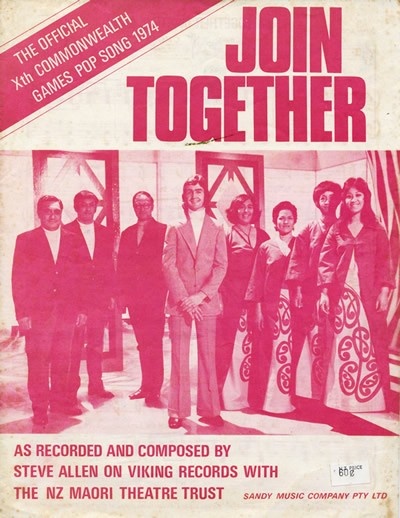'Join together' song, 1974 Commonwealth Games

Hear 'Join together'.
This clip requires Flash Player 7 or higher. Download latest Flash Player.
Click on the arrow to play (2.8mb).
Download the music and lyrics (700k, pdf).
The 10th Commonwealth Games, held in Christchurch in January 1974, was an odd coupling of 1970s cosmic harmony and cut-throat competition. The song that caught the mood of this Woodstock in tracksuits was Steve Allen’s hummable, even uplifting, anthem ‘Join together’.
Promo song
Steve Allen’s career was in full flight in 1973 when he wrote 'Join together'. Still in his early 20s, Allen (real name Alan Stevenson) had won the RATA award for Best Male Vocalist, released two albums and earned a number one hit for a memorable cover of the Carpenters’ song ‘Top of the world’. His ambition was to write and sing his own material.
Allen remembers bashing out the tune of 'Join together' on a piano in about half an hour: ‘As with all good songs, it fell into place. The words were predetermined; it was just a case of finding a simple tune to string them together.’
'Join together' was recorded at the EMI studios in central Wellington in the winter of 1973. Its backing track was created by one guitarist, bassist and drummer, with Allen on keyboards. The song’s big production feel with the fat drum sounds came later when the vocals of the seven-strong New Zealand Maori Theatre Trust were overdubbed. Allen found himself with a hit in September 1973 after winning a $300 prize in a Studio One contest to find a promotional pop song for the Commonwealth Games to be held in Christchurch early in the following year.
The song was played constantly in the months leading up to the games. It went as high as number two on the NZBC’s Pop-o-Meter Top 20, just failing to unseat Helen Reddy’s ‘Delta Dawn’.
The very friendly games
The games opened on 24 January 1974. In front of a crowd of 35,000 Allen and a massed choir sang ‘Join together’ and ‘What the world needs now is love’. Thousands of children wearing plastic capes of red, white and blue made a living games symbol in the middle of the Queen Elizabeth II stadium. This bright display was for the benefit of a TV audience watching pioneering colour broadcasts. Allen later recalled 'being stuck in the middle of an awful lot of people, a long march and being pretty chuffed to be singing my own material'.
A well-oiled publicity machine minted the term ‘The Friendly Games’. Christchurch police chief Gideon Tait said he wanted foreign competitors and visitors to get the impression they were visiting ‘an angelic city’ free of crime and violence.
Sometimes the games were a little too friendly. Late-night communing between athletes led to claims that Allen’s hippy-dippy 1970s lyric ‘the games are for the fostering of peace and love’ was being taken too literally. There was the same free-and-easy mood of the previous year’s Great Ngaruawahia Pop Festival.
From all parts of the world
Allen's lyrics spoke of Commonwealth unity, but there had been rumblings about the games. In April 1973 the Labour prime minister, Norman Kirk, prevented a possible boycott by black African nations when his government halted a rugby tour of New Zealand by the Springboks from apartheid South Africa.
The song's line that ‘people black and white will come from all parts of the world’ underlined the mission to preserve Commonwealth unity. The credibility of Allen’s song was enhanced when the South Africans later banned it because of so-called unsuitable words such as ‘freedom, race, creed, peace, war, black and white’.
Post-games
'Join together' became a cliché, even an albatross for Allen. In 1978 he was quoted as saying, ‘I sometimes wish everybody would just forget all about "Join together". It has been over-emphasised – people think it’s all I’ve ever done because it had so much publicity.’
Today, Allen says he was quoted out of context but agrees that he was frustrated that none of his other songs received the acknowledgment they deserved: ‘It’s nice to be remembered for "Join together", but nice to be remembered for other things as well.’
Words and music for 'Join together' are provided with copyright permission from Sandy Music and Viking Sevenseas Limited.
This page is based on an article by Redmer Yska that appeared in North and South, 1994.


 del.icio.us
del.icio.us Facebook
Facebook Google
Google StumbleUpon
StumbleUpon Twitter
Twitter







Community contributions